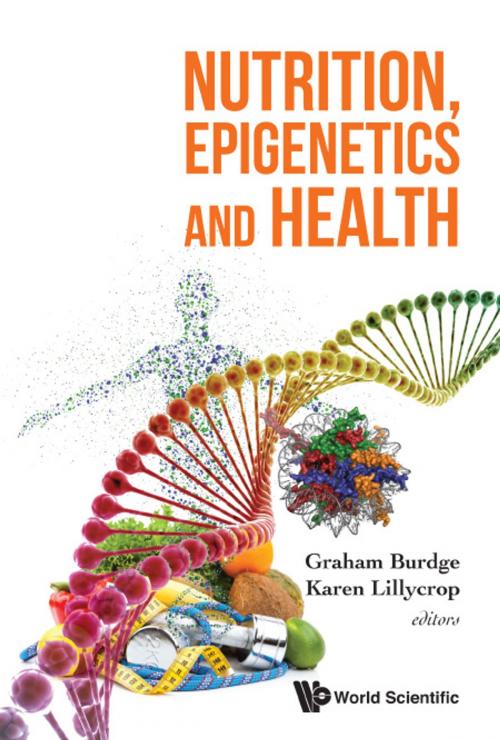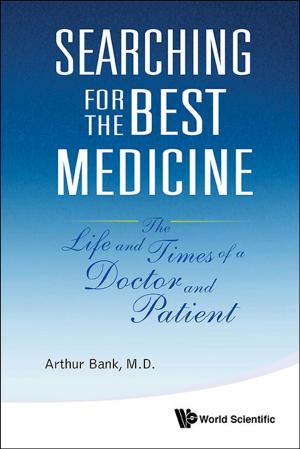Nutrition, Epigenetics and Health
Nonfiction, Health & Well Being, Medical, Patient Care, Health Care Delivery, Nutrition| Author: | Graham Burdge, Karen Lillycrop | ISBN: | 9789813143326 |
| Publisher: | World Scientific Publishing Company | Publication: | October 7, 2016 |
| Imprint: | WSPC | Language: | English |
| Author: | Graham Burdge, Karen Lillycrop |
| ISBN: | 9789813143326 |
| Publisher: | World Scientific Publishing Company |
| Publication: | October 7, 2016 |
| Imprint: | WSPC |
| Language: | English |
Epigenetics is emerging as an important factor in risk of diseases of global importance including obesity, cardiovascular disease and cancer. Unlike gene polymorphisms which have been the focus of understanding the role of inherited disease susceptibility for some time, epigenetic can be modified by environmental factors, in particular nutrition. Thus research into the role of epigenetics in disease has substantial potential for explaining the impact of the environmental factors such as diet on disease risk. Since epigenetic processes can be modified by nutrition, it may be possible to modify inappropriate epigenetic marks by nutritional interventions to reduce disease risk. This book will explore current understanding of the interaction between nutrition, epigenetics and disease risk, will place this knowledge in the context of global health and discuss the ethical implications of this research.
Contents:
- Basic Mechanisms in Epigenetics (Karen A Lillycrop)
- Nutrition, Epigenetics and the Early Life Origins of Disease: Evidence from Human Studies (Nina D'Vaz and Rae-Chi Huang)
- The Early Life Nutritional Environment, Epigenetics and Developmental Programming of Disease: Evidence from Animal Models (Mark H Vickers)
- Lipids and Epigenetics (Graham C Burdge)
- Circadian Biology: Interaction with Metabolism and Nutrition (Jonathan D Johnston)
- Nutrition, Epigenetics and Aging (John C Mathers and Hyang-Min Byun)
- Nutrition and Epigenetics: Evidence for Multi- and Transgenerational Effects (Cheryl S Rosenfeld)
- Epigenetic Biomarkers and Global Health (Paula Costello and Mark Hanson)
- Nutrition, Epigenetics and Health: Evolutionary Perspectives (Sinead English & Tobias Uller)
- The Body Politic: Epigenetics and Society (Noela Davis)
Readership: Nutritionists, molecular biologists and those involved in global health issues.
Key Features:
- Uniquely places nutrition and epigenetics in a global health context or addresses the ethical and social implications of this new research
- A contemporary review that explores the relationship between nutrition and epigenetics in the context of global health with consideration of the ethical issues that it raises, which have not really been articulated in detail in any review
Epigenetics is emerging as an important factor in risk of diseases of global importance including obesity, cardiovascular disease and cancer. Unlike gene polymorphisms which have been the focus of understanding the role of inherited disease susceptibility for some time, epigenetic can be modified by environmental factors, in particular nutrition. Thus research into the role of epigenetics in disease has substantial potential for explaining the impact of the environmental factors such as diet on disease risk. Since epigenetic processes can be modified by nutrition, it may be possible to modify inappropriate epigenetic marks by nutritional interventions to reduce disease risk. This book will explore current understanding of the interaction between nutrition, epigenetics and disease risk, will place this knowledge in the context of global health and discuss the ethical implications of this research.
Contents:
- Basic Mechanisms in Epigenetics (Karen A Lillycrop)
- Nutrition, Epigenetics and the Early Life Origins of Disease: Evidence from Human Studies (Nina D'Vaz and Rae-Chi Huang)
- The Early Life Nutritional Environment, Epigenetics and Developmental Programming of Disease: Evidence from Animal Models (Mark H Vickers)
- Lipids and Epigenetics (Graham C Burdge)
- Circadian Biology: Interaction with Metabolism and Nutrition (Jonathan D Johnston)
- Nutrition, Epigenetics and Aging (John C Mathers and Hyang-Min Byun)
- Nutrition and Epigenetics: Evidence for Multi- and Transgenerational Effects (Cheryl S Rosenfeld)
- Epigenetic Biomarkers and Global Health (Paula Costello and Mark Hanson)
- Nutrition, Epigenetics and Health: Evolutionary Perspectives (Sinead English & Tobias Uller)
- The Body Politic: Epigenetics and Society (Noela Davis)
Readership: Nutritionists, molecular biologists and those involved in global health issues.
Key Features:
- Uniquely places nutrition and epigenetics in a global health context or addresses the ethical and social implications of this new research
- A contemporary review that explores the relationship between nutrition and epigenetics in the context of global health with consideration of the ethical issues that it raises, which have not really been articulated in detail in any review















